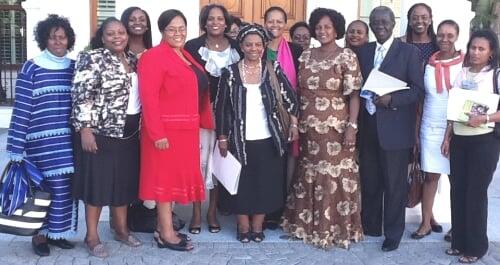The High Level Taskforce for Women, Girls, Gender Equality and HIV for Eastern and Southern Africa (HLTF) visited South Africa from 21-28 October to provide high-level advocacy on an apparent sexual health crisis among young women and to press for accelerated action to address this crisis.
The visit came at the invitation of the Department for Women, Children and People with Disability (DWCPWD). The HLTF interacted with senior government officials, parliament and civil society organizations, across three of South Africa’s nine provinces (Gauteng, Western Cape and KwaZulu-Natal).
The Taskforce was formed at a tripartite meeting of COMESA, SADC and the EAC (supported by UNAIDS) in April 2011, at which member states, civil society and development partners reviewed progress made in the area of gender equality and HIV. They sought to identify any remaining barriers and to craft solutions for accelerated action in fulfillment of the UNAIDS Agenda for Accelerated Country Action for Women, Girls, Gender Equality and HIV.
At the gender and HIV meeting, participants agreed a “Windhoek Declaration for Women, Girls, Gender Equality and HIV,” alongside which they also agreed to establish a taskforce to monitor implementation of the declaration and to support country action for accelerated action in this regard.
At the Department’s invitation to the High Level Taskforce, its members were asked to focus on three specific areas of challenge, to profile them during the mission and to advocate for urgent action to address them. The challenges were the high rate of teenage pregnancies, gender-based violence (in particular, hate crimes against the lesbian, gay, bi-sexual, transgender and inter-sex community) and elimination of mother-to-child transmission fo HIV (with a particular focus on keeping mothers alive).
These priority areas align with the High Level Taskforce’s advocacy action plan 2012/2013 which highlights a focus for the taskforce in sexuality education and preventing new HIV infections among young women; and sexual and reproductive health and rights (with a particular focus on the rights of women living with HIV). The action plan also identifies six priority countries for advocacy – South Africa, Swaziland, Mozambique, Angola, Uganda and Ethiopia.
The mission met high profile government representatives, including Deputy President and chair of the AIDS Council, Mr. Kgalema Motlanthe; the Parliamentary Portfolio Committee for Women, Children and People with Disabilities; the Minister of Health, Dr. Aaron Motsoaledi; the Minister of Social Development, Bathabile Dlamini, and the Zulu King, His Majesty King Goodwill Zwelithini. They held discussions with various civil society organizations representing the LGBTI Community (Free Gender); Sex Workers (SWEAT, Sisoke and Embrace Dignity); Mothers to Mothers Mentor Mothers; School Governing Bodies; and members of the South African National AIDS Council.
Changes needed to individual behaviour
The HLTF noted that while South Africa has the necessary legislative, policy and organizational structures to deal with HIV, there is a huge disjuncture between macro-level legislation and policy and realities at community and grassroots levels, where attitudes and practices were not aligned to the favourable constitutional dispension that South Africa enjoys. The country now needed to focus attention on the difficult issue of societal transformation and changes to individual behaviour, beliefs and practices, the HLTF noted.
The Taskforce made broad recommendations in this area, with a proposal for an eight-point action plan entailing a cross-sectoral partnership led by a fully resourced DWCPWD with the Commission of Gender Equality and the Departments of Education, Health, Social Development, Police Services, Justice & Constitutional Development, Local Government and the Presidency. The action plan is as follows:
- Identify ‘community gateways’ for Accelerated Community Mobilization and Action;
- Establish a multi-sectoral Leadership SRHR Compact;
- Impose sanctions and strengthen sector-wide accountability on SRHR;
- Award positive/protective leadership & institutional Behaviour
- Convene yearly national crisis summits on “Promoting & Protecting the Rights of Young Women and Girls in South Africa”;
- Review legislation, close existing legislative gaps & fast track pending legislation;
- Increase funding, capacity and authority of DWCPD;
- Increase funding for women, men and minority CSO groups for national-wide replication of good practices.


